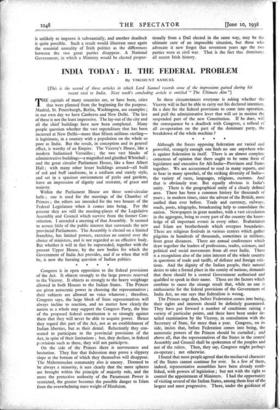INDIA TODAY : II. THE FEDERAL PROBLEM
By VISCOUNT SAMUEL
[This is the second of three articles in which Lord Samuel records some of the impressions gained during his recent visit to India. Next week's concluding article is entitled " The Ultimate Aiml THE capitals of many countries are, or have been, cities that were planned from the beginning for the purpose. Madrid, St. Petersburgh, Berlin, Washington, are examples ; in our own day we have Canberra and New Delhi. The last of these is not the least impressive. The lay-oin of the city and all the chief buildings have now been completed. Many people question whether the vast expenditure that has been incurred at New Delhi—more than fifteen millions sterling— is legitimate, in a country with a population on the whole so poor as India. But the result, in conception and in general effect, is worthy of an Empire. The Viceroy's House, like a modern Indianised Versailles ; the two vast blocks of administrative buildings—a magnified and glorified Whitehall ; and the great circular Parliament House, like a finer Albert Hall ; with many other lesser buildings around—all built of red and buff sandstone, in a uniform and stately style, and set in a spacious environment of parks and gardens, leave an impression of dignity and restraint, of grace and majesty.
Within the Parliament House are three semi-circular halls ; one is used for the meetings of the Chamber of Princes ; the others are intended for the two houses of the Federal Legislature when it comes into being. For the present they are still the meeting-places of the Legislative Assembly and Council which survive from the former Con- stitution. I attended a meeting of that Assembly. It seemed to arouse little of the public interest that surrounds the new provincial Parliaments. The Assembly is elected on a limited franchise, has limited powers, exercises no control over the choice of ministers, and is not regarded as-an effective body. But whether it will in fact be superseded, together with the present Upper House, by the new bodies for which the Government of India Act provides, and if so when that will be, is now the burning question of Indian politics.










































 Previous page
Previous page